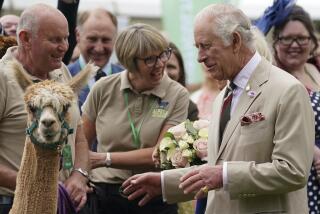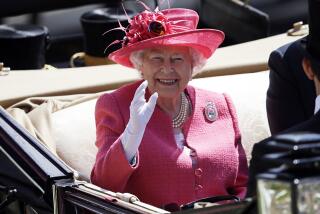ROYALTY : The Queen Provides a Rich Debate : Parliament takes up a brash suggestion--make Elizabeth pay income tax.
- Share via
LONDON — Is she or isn’t she the world’s richest woman? And should or shouldn’t she pay taxes on her income, just like everyone else? Those brash questions about Queen Elizabeth II were raised in Parliament this week by Liberal Party MP Simon Hughes in a move that reflected the opinion of a majority of citizens.
More than 70% of Britons, polls show, believe her income should be subject to taxes. Or, as Hughes put it, “When so many people in my (London) constituency are scraping along and asked to contribute tax on very low incomes, it seems grossly unfair that the person with the highest income escapes. And there’s no reason a modern constitutional monarch shouldn’t pay taxes.”
The queen’s personal net worth has long been a matter of speculation and argument, since, unlike U.S. heads of state, she is not required to make public the amount of her wealth and she has not volunteered the information. Fortune magazine estimates it at $7.4 billion, with an income running at perhaps $3 million a day. Buckingham Palace snorts that that sum is “grossly exaggerated.”
Over the years, researchers have tried to estimate the queen’s personal capital and income. The major resources include whatever money she inherited from her father, King George VI; a vault full of precious jewels; the royal art collection, with 900 Leonardo da Vinci drawings, 26 Van Dycks and works by other masters, and one of the world’s most valuable stamp collections. She also owns hundreds of thousands of prime agricultural acres, as well as valuable property in central London. Then there’s Balmoral and Sandringham castles with 64,000 acres between them. And not to be forgotten are the royal stables.
There is no public list of the queen’s properties; all royal wills are unpublished. The government also picks up the tab for all her travel and official entertainment for foreign dignitaries.
But her major source of income may be her private investments, which have accrued tax-free over a long period. In 1971, the palace let it be known that her portfolio of stocks did not exceed 50 million pounds.
Taking an even lower figure of 35 million pounds, Andrew Morton, author of “Theirs is the Kingdom: the Wealth of the Windsors,” consulted experts who estimated that, if reasonably wisely invested, the portfolio would be worth 600 million pounds today. He estimates the queen’s personal wealth at 1.2 billion pounds, or nearly $2 billion.
Her investment portfolio is managed in great secrecy by an adjunct of the Bank of England, and the activities of her investment counselors are privileged information. But not having to pay the 40% income tax, the stash is thought to have increased rapidly. Further, the royal family is not subject to Britain’s steep inheritance tax.
Curiously, the exemption of the monarch from taxes is fairly recent: Queen Victoria inherited a 50,000-pound debt along with the throne. She turned this into a profit and was thought to be well in the black when she died.
Researcher Phillip Hall, who is writing a book on the subject, spent five years looking through public records and concluded that Queen Victoria paid taxes, as did her son King Edward VII. His son, George V, got the tax removed from the Civil List he received from the government but not from his private income, Hall said. The king later had the taxes removed from the royal estates.
But in the reign of George VI, after his accession in 1936, he persuaded the government to end his taxes entirely; he explained to Parliament that the monarch “naturally” does not pay tax.
Parliamentary specialists believe the Hughes bill will go nowhere. The Conservatives tend to argue that if the government charged her tax, they would just have to increase the money given her in the Civil List. Tory MP stalwarts like Sir John Stokes justify the queen’s non-tax status with the view: “She is not like Mrs. Buggins. She is different from everybody else.”
The Assets of the Monarchy
Queen Elizabeth’s personal assets differ from the institutions of the monarchy. These royal holdings include:
* The crown jewels in the Tower of London.
* The official residences of Buckingham Palace, Windsor Castle and Holyrood Castle.
Her current official income from the British government--what is called the Civil List--is 7.9 million pounds, or about $12.5 million. That sum is much more than her royal household expenses, giving her a comfortable surplus this year.
More to Read
Sign up for Essential California
The most important California stories and recommendations in your inbox every morning.
You may occasionally receive promotional content from the Los Angeles Times.













